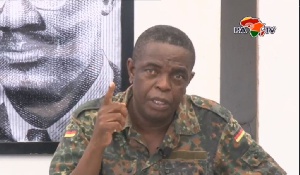- Home - News
- TWI News | TV
- Polls
- Year In Review
- News Archive
- Crime & Punishment
- Politics
- Regional
- Editorial
- Health
- Ghanaians Abroad
- Tabloid
- Africa
- Religion
- Election 2020
- Coronavirus
- News Videos | TV
- Photo Archives
- News Headlines
- Press Release
General News of Thursday, 30 October 2008
Source: GNA
It was not a debate - Analysts
Accra, Oct. 30, GNA - Some political analysts, who attended the first round of the Institute of Economic Affairs (IEA) Election 2008 Presidential Debate on Wednesday said it was more of a question an answer session than a debate.
They were of the view that in a debate the candidates should have had the chance to challenge each other's positions instead of answering questions from the moderators, with very little rebuttals. The debate featured Nana Addo-Dankwa Akufo Addo of the New Patriotic Party (NPP); Professor John Evans Atta Mills of the National Democratic Congress (NDC); Dr Paa Kwesi Nduom of the Convention People's Party (CPP) and Dr Edward Mahama of the People's National Convention (PNC).
The moderators were Professor Kwame Karikari, Associate Professor, School of Communications Studies, University of Ghana and Mr Cyril Akolatse, a Veteran Broadcaster.
The moderators, whose microphone sometimes went off, took turns and asked a total of 11 major questions and seven minor questions. In all, there were eleven major questions, which focused on job creation, education, health, security, law and order, oil revenue, energy, women and children's rights, foreign direct investment, food security and intra-regional trade.
There were four rounds of four questions each. For the first two rounds each candidate had three minutes to answer a major questions and a minute for rebuttal, which was optional. Two minutes was allotted for major questions in the third and fourth rounds and each was given an extra two minutes to make concluding remarks.
Dr Kwesi Jonah, a Resident Scholar at the Institute of Democratic Governance (IDEG), who was one time with the IEA, told the GNA that even though the quality of the answers provided was good, the format of the programme did not meet the requirements of a debate. "The candidates should have made brief opening statement on their position on the economy generally and that would have set the tone for them to debate each other based on their positions," he said. Dr Jonah said issues of macro-economic management was completely out of the picture and that was not good for as debate on how to manage the economy since all the major problems of the country were hinged on macro-economic management.
Mr Mike Eghan, National Treasurer of the Convention People's Party, also shared a similar view saying that the candidates should have debated each other's positions instead of spending all the time answering questions from the Moderators. Unlike previous presidential debates in 2000 and 2004, this time journalists were kept out of the main debate hall. Organisers of the programme seemed not to appreciate that journalists relied to a large extent on the body language of newsmakers in crafting their stories, and consigned them to an adjacent room with a projector television screen, and thus compelling them to pick the news from the perspective of a cameraman.
The Security at the venue, Kofi Annan ICT Centre, allowed in only high profile and specially invited guests numbering about 260. At exactly 1900 hours the candidates made a majestic entrance, led by traditional horn blowers. Ghana's leading acappella music group, The Alabaster Box was at hand to render the national anthem. The question and answer sessions went generally smooth except for a few minor intermittent interruptions, which attracted laughter from the audience, who were prohibited from clapping during the main sessions. For instance Dr Mahama at a point questioned why Nana Addo-Dankwa had a turn instead of him and again he made a rebuttal without getting approval from the Moderators.
Dr Nduom also created some fun with the display of CPP identity card; his "yeresesamu" signal; his claim to have managed an effective pension scheme in Zimbabwe; a country that is currently in an economic mess.
Professor Mills used his opportunities to point out the mistakes of the sitting Government, which attracted at least two rebuttals from Nana Akufo-Addo, whiles Dr.Nduom and Dr Mahama spent their time articulating what changes they intended to bring into the economy.
Like many others, who spoke with the GNA, Mr Jonah described Dr Nduom as an Economic Nationalists, who clearly stood out with definite articulations of what he had in mind for the country if he became president.
"Dr Ndoum states what the State and what Ghanaians will do to move the country forward whiles the others kept cataloguing what they will do as individuals to change the fortunes of the people," he said. The level of Dr Nduom's impressiveness was such that Nana Akufo-Addo was often caught nodding his head in approval of Dr Nduom's presentations and articulations.
Cardinal Peter Appiah Turkson, Chairman of the Debate Committee, said he was particularly impressed with the display of friendship among the candidates depicted by the way they shook hands at the start and at the end of the debate.
"By that act they have sent a signal to their followers across the country that they are not enemies and that is good for a peaceful election," he said.
Cardinal Turkson said the 11 questions were just about half of the whole, saying that during the second debate in Tamale on November 12, other questions would be put to the candidates.
Jean Mensah, IEA Administrative Manager, said he was pleased with the debates but said they would take the criticism and improve the one to be held in Tamale.
She said after November 12, IEA would create a separate opportunity for the remaining contesting political parties to also debate, "if only they are interested."










